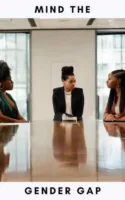Have you ever jumped on the Gautrain and wondered why the ticket feels like it’s eating your wallet? Especially during the holiday rush, when “Mind the Gap” becomes more than just a safety reminder—it’s a glimpse into the wider gap we’re navigating: the gender wealth gap in South Africa. Forking out R3,595 for a Gautrain monthly pass makes joining a carpool look more appealing. This hefty sum, outlined on the Gautrain site for a daily commute between Park Station and Centurion, highlights the everyday financial juggling many of us face.
Let’s dig deeper. Imagine landing your first job with a salary of R13,000. After taxes and contributions, you’re left with about R10,530. Now, take away the Gautrain cost for commuting, and what’s left for rent, food, and the basics barely covers the essentials. “After paying for my commute and rent, I’m left figuring out how to stretch R2,435 for everything else. It’s like a monthly puzzle,” says Naledi, a 22-year-old media intern in Johannesburg.
The reality hits harder for women. In South Africa, women earn roughly 78 cents for every rand a man makes, spotlighting a glaring 32% average pay difference. “It’s frustrating knowing that my male colleagues might be earning more for the same work. It makes financial independence seem even more out of reach,” shares Thando, a recent graduate navigating her new role in tech.
So why does this gap exist? When exploring the root causes of the gender wealth gap, I found that:
– Occupational Segregation: High-paying fields have fewer women, limiting their wealth-building opportunities.
– Unpaid Care Work: Women often shoulder more family care responsibilities, impacting their ability to work full-time.
– Inheritance and Gender Norms: Traditional beliefs sometimes favour men in wealth distribution and financial decision-making.
– Workplace Discrimination: Women can face barriers to promotions and fair pay, with entrepreneurship needing more female representation.
Amid these challenges, it’s crucial to maintain our power to initiate change. Speaking out against unfair treatment and demanding equal pay are steps towards financial feminism. The CCMA offers resources for those facing discrimination, emphasising the importance of raising your voice.
It’s not enough to wait for policymakers to close the gender wealth gap. Each of us has a role in advocating for our value in the workplace and exploring careers that offer robust financial futures. The National Scarce Skills list is a fantastic place to start, highlighting in-demand careers that can pave the way to closing the wealth gap.
STEM (Science, Technology, Engineering, and Mathematics) offers lucrative career paths and is crucial in shaping our future world. Thando, who ventured into tech, shares her experience: “Diving into computer science was initially intimidating. The field felt dominated by men, and I often questioned my place in it. But as I learned more, I saw the vast potential for innovation, problem-solving, and financial security. It dawned on me that being part of this wave of change could boost my career and create opportunities for other young women in STEM.”
The scope of STEM careers extends far beyond traditional roles. High-earning positions in artificial intelligence (AI), renewable energy, biotechnology, and cybersecurity offer exciting opportunities for women. These fields require creativity, analytical skills, and a passion for solving complex problems—attributes many young women possess in abundance. “Realizing that STEM is about so much more than numbers, that it’s about shaping the future, made all the difference. It’s empowering to contribute to areas that significantly impact our lives,” Thando adds.
Financial feminism isn’t just about individual actions; it’s a collective movement towards equality. By demanding fair pay, supporting women in male-dominated fields, and educating ourselves and others, we can make strides in closing the gender wealth gap.
The gap isn’t just in the system; it’s in how we choose to challenge and change it. “Seeing women in my field succeed gives me hope and motivation. It’s a reminder that we can bridge this gap together,” Naledi reminds us.
For every young woman stepping into the world, remember that your voice and actions have the power to reshape our financial landscapes. Financial feminism starts with us.
How are you challenging the gender wealth gap?



